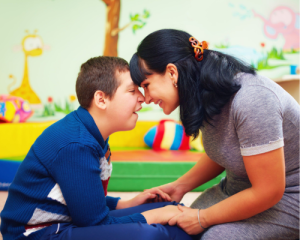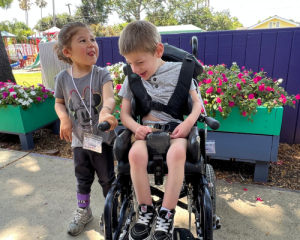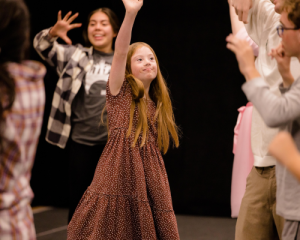
Raising a child with a disability brings a unique set of joys and challenges for a family — increased struggles with daily routines, finances, and navigating the maze of doctors and support services. This can be complicated by decreases in the amount of time parents spend engaged in the community, with friends or as a couple. However, research demonstrates that many families who have a child with a disability are able to balance these demands and believe their family is closer, stronger and happier because of their challenges.
Resilience is the ability to withstand hardship and rebound from adversity, becoming stronger and more resourceful in the process. Dr. Froma Walsh (2003), a family therapist, has identified characteristics and practices of resilient families.
- Resilient families are optimistic and have a “can do” attitude when faced with adversity. Crisis is viewed as meaningful and manageable. They are adaptable and can rebound and reorganize in the face of challenges.
- Resilient families use clear, consistent, honest communication — openly sharing feelings and opinions and practicing empathy.
- Resilient families know they can count on each other. They work as a team to solve problems and make time to have fun together.
- Resilient families find strength, comfort and guidance in adversity through cultural and religious traditions, nature or music. They create a support network of people and organizations to provide practical assistance, emotional support, connection.
Families may recognize resilient factors or identify different practices that work for them. Many factors influence the well being of a family, though making small changes can help build resilience.
Practice and prioritize self-care. Putting your well-being before others may seem counterintuitive. Though if you want to take the best possible care of your child, first take the best possible care of yourself. Make time for friendships and exploring creative interests.
Become informed and make connections. Take advantage of services and activities in your area. Develop a support system of family and friends. This can be in-person or through on-line networking. Be mindful time spent on social and the internet. Ask “Is what I’m reading relevant to my child? Helpful? A reliable source?”
Engage in fun activities together. Laughter can revitalize families who are under stress. This can be as simple as watching a movie together or playing a board game. Siblings of children with disabilities need attention that is individualized and celebrates their uniqueness. There are stressful aspects to having a brother or sister with a disability, though many siblings embrace this as a positive experience, often developing compassion, patience and tolerance.
Re-think and revise family and household responsibilities. Don’t compare yourself to others…there is no “perfect” family. Allow imperfections and decide for yourself how to prioritize your values and make your life work for your family.
Creating a more resilient family is not an end goal but a process. Families make decisions about what is best for their child and family. It is important to make small steps toward working together, growing stronger, and learning ways to promote a positive future for your children and family.
By Dr. Jeanne Anne Carriere
Jeanne Anne Carriere, Ph.D. works in the College of Educational Studies at Chapman University and is the Educational Assessment Team Director at The Center for Autism & Neurodevelopmental Disorders.







Leave a Reply